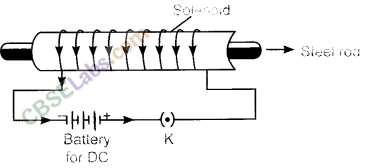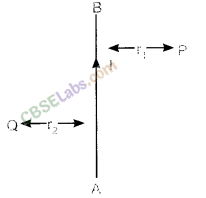NCERT Exemplar Class 10 Science Chapter 13 Magnetic Effects of Electric Current are part of NCERT Exemplar Class 10 Science . Here we have given NCERT Exemplar Class 10 Science Chapter 13 Magnetic Effects of Electric Current.
NCERT Exemplar Class 10 Science Chapter 13 Magnetic Effects of Electric Current
Short Answer Type Questions
1.A magnetic compass needle is placed in the plane of paper near point A as shown in figure. In which plane should a straight current carrying conductor be placed so that it passes through A and there is no change in the deflection of the compass? Under what condition is the deflection maximum and why?

Answer.
In the given situation, a straight current-carrying conductor should be placed in the plane of paper. The held produced by it is perpendicular to the plane of paper and parallel to the vertical axis of compass needle. As a result there will be no change in the deflection of compass needle.
The deflection is maximum when the straight current carrying conductor through the point A is perpendicular to the plane of paper so that field due to it is parallel to the plane of paper.
2. Under what conditions permanent electromagnet is obtained if a current carrying solenoid is used? Support your answer with the help of a labelled circuit diagram.
Answer.
Required conditions are:
(i) The magnitude of direct current through the solenoid should be large.
(ii)The number of turns in the solenoid should be large and closely packed, so that a strong uniform magnetic field inside it is produced.
(iii) The rod kept inside is made of a magnetic material such as steel.

3.AB is a current carrying conductor in the plane of the paper as shown in figure. What are the directions of magnetic fields produced by it at points P and Q? Given r
1
> r
2
,
where will the strength of the magnetic field be larger?

Answer.
Apply right hand thumb rule, the direction of magnetic field produced by a current carrying conductor at Point P – into the plane of paper
Point Q – out of the plane of paper.
As magnetic field is inversely proportional to distance, the field at Q will be larger than the field at P (
r
1
>
r
2
).
4.It is established that an electric current through a metallic conductor produces a magnetic field around it. Is there a similar magnetic field produced around a thin beam of moving (i) alpha particles, (ii) neutrons? Justify your answer.
Answer.
(i) Yes, similar magnetic field is produced around a thin beam of moving a-particle. a-particle being positively charged constitutes a current in the direction of beam motion.
(ii) No, neutron being electrically neutral, does not constitute a current.
5.Name four appliances wherein an electric motor, a rotating device that converts electrical energy to mechanical energy, is used as an important component. In what respect motors are different from generators?
Answer.
The four appliances wherein electric motor, a rotating device that converts electrical energy into mechanical energy is used are electric fan, water pump, grinder and washing machine.
Difference between electric motor and generator:
|
Electric Motor |
Electric Generator |
|
(a) It converts electrical energy into mechanical energy. |
(a) It converts mechanical energy into electrical energy. |
| (b) It works on the principle of magnetic effect of electric |
(b) It works on the phenomenon of electromagnetic induction. |
6.What is the role of the two conducting stationary brushes in a simple electric motor?
Answer.
The two stationary conducting brushes make the contact in between the two halves of the split rings and the source battery. Current in the coil enters from the source battery through one conducting brush and flows back to the battery through another brush.
Long Answer Type Question
1.Why does a magnetic compass needle pointing North and South in the absence of a nearby magnet get deflected when a bar magnet or a current carrying loop is brought near it. Describe some salient features of magnetic lines of field concept.
Answer.
Both the bar magnet or a current carrying loop have their own magnetic field. These external magnetic fields modify the earth’s existing magnetic field. This resultant magnetic field deflects the magnetic compass needle by exerting a magnetic force on it, from its original north-south direction.
Features of magnetic field lines are: ‘
- Magnetic field lines represent the magnetic field around the magnetic substance or current carrying conductor. They have both direction and magnitude.
- The field lines emerge from North pole and merge at South pole. Inside the magnet their direction is from south pole to north pole. Hence magnetic field lines are a continuous closed curve.
- The degree of closeness of the field lines is relative to the strength of magnetic field. Strong magnetic field is indicated by crowded field lines or vice versa.
- No two magnetic field lines intersect each other. If they intersect, the compass needle would point towards two different directions at a point, which is impossible.
- The parallel and equidistant field lines in a given region indicate the presence of a uniform magnetic field in that region whereas converging or diverging field lines represent the non-uniform magnetic field.
NCERT Exemplar Class 10 Science Solutions
- Chapter 1 Chemical Reactions and Equations
- Chapter 2 Acids Bases and Salts
- Chapter 3 Metals and Non-metals
- Chapter 4 Carbon and its Compounds
- Chapter 5 Periodic Classification of Elements
- Chapter 6 Life Processes
- Chapter 7 Control and Coordination
- Chapter 8 How do Organisms Reproduce
- Chapter 9 Heredity and Evolution
- Chapter 10 Light Reflection and Refraction
- Chapter 11 Human Eye and Colourful World
- Chapter 12 Electricity
- Chapter 13 Magnetic Effects of Electric Current
- Chapter 14 Sources of Energy
- Chapter 15 Our Environment
- Chapter 16 Management of Natural Resources